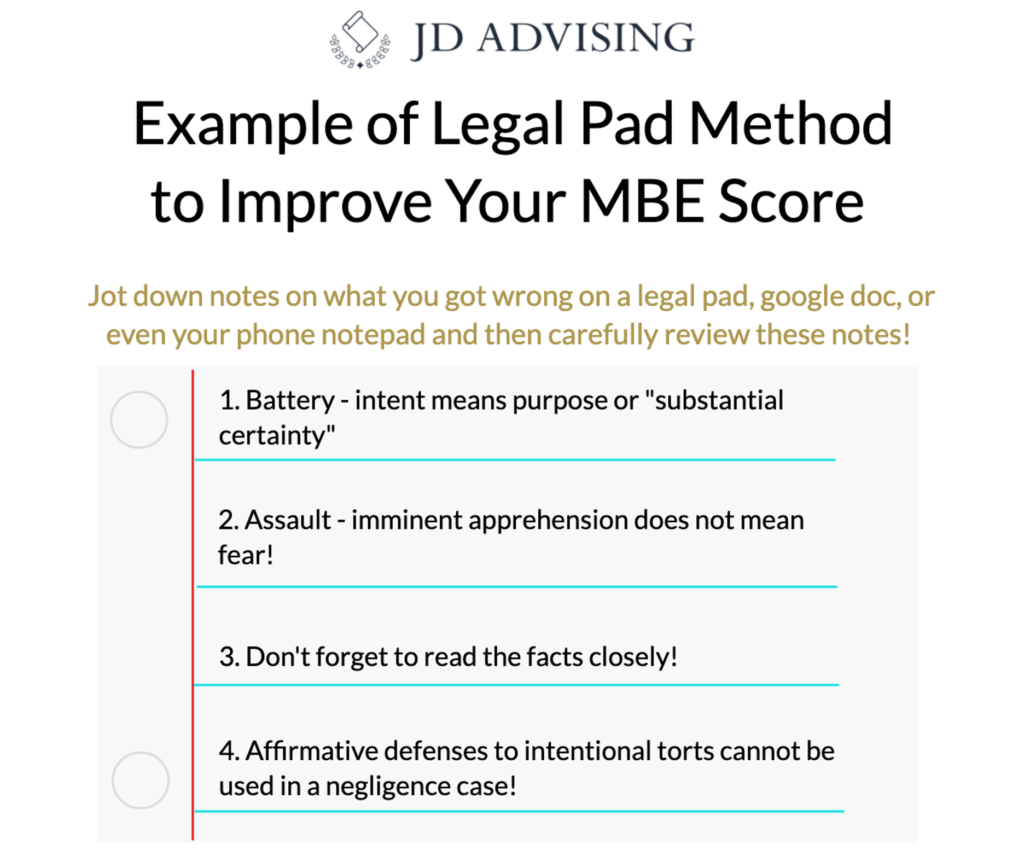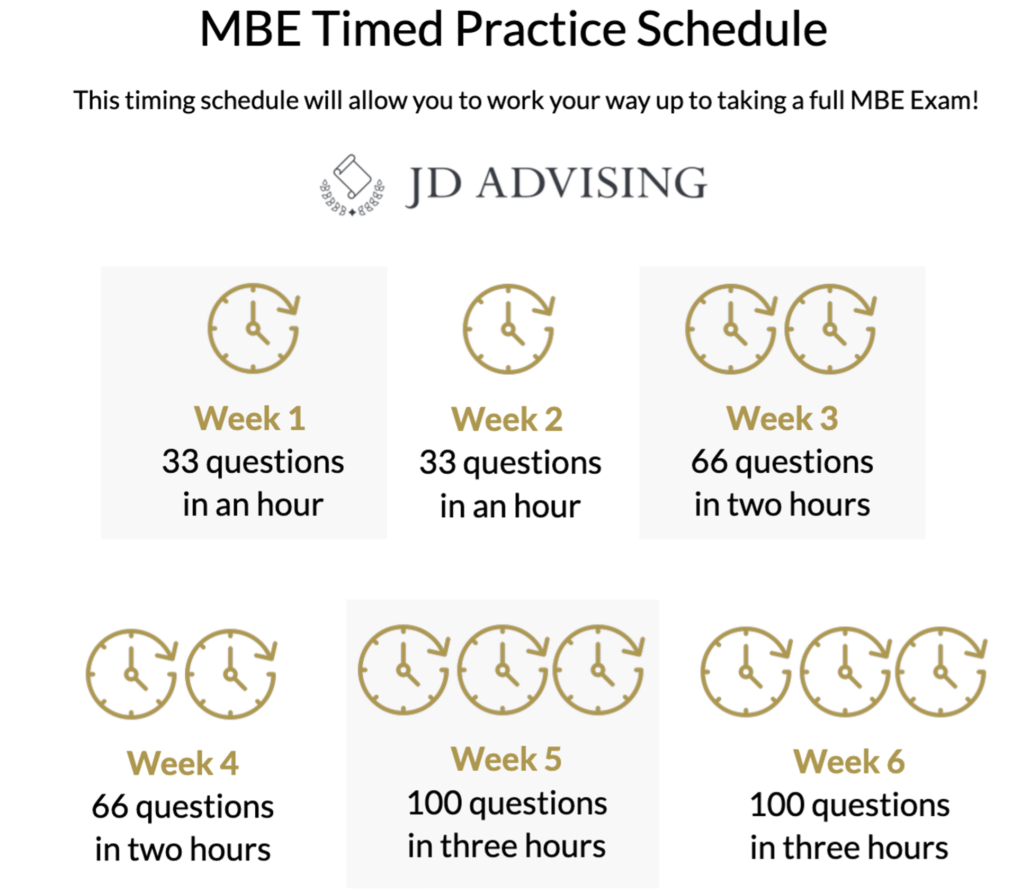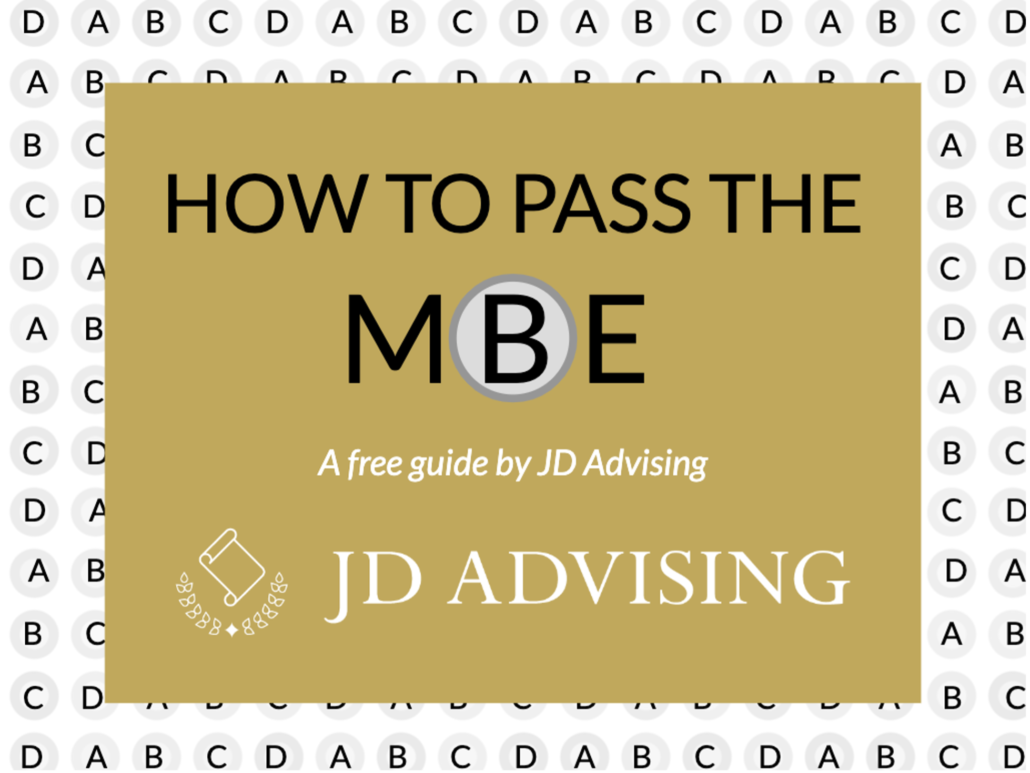Topic 4: Boost Your MBE Score Using This Powerful Method
Topic 4: Boost Your MBE Score Using This Powerful Method
Avoid the Common Mistake of Practicing Without Purpose!
Many students who want to pass the MBE make the mistake of simply answering MBE practice question after practice question and hope that their score improves. That is not the right way to approach the MBE! You will save a lot of time and energy—and feel much more confident in your MBE approach and your MBE score—if you follow these six steps.
These steps will give you the proper foundation to actually improve your score through practice, rather than simply going through the motions without seeing much improvement. We go into more detail on many of these steps throughout this MBE guide. But here, we outline the basic six-step approach you should use.
Note that this method sets the foundation for learning the law and making sure that you are using your time most efficiently when you practice. Topic 6 in this guide discusses a detailed approach to answering an individual MBE question in the best way possible.
Check out this video on how to pass the MBE and avoid common mistakes!
1. Make sure you have good outlines!
When you are studying for the MBE, the first step is to make sure you have top-notch materials. When studying for the MBE, you should focus on memorizing your outlines. So, you want to ensure you have high-quality outlines that are tailored to what is tested. If your outline is too short (e.g., five pages long) or so long that it is more like a textbook than an outline (e.g., 200+ pages long) then you are not using an efficient outline! Similarly, if your outlines are poorly organized or difficult for you to read, then it is time to get new outlines.
If you find your commercial course outlines are not working for you, try our JD Advising outlines (these are included with our courses or with tutoring).
2. Make sure you understand the law.
The next step is to make sure you understand the law. It is critical to understand the law before attempting to memorize it and apply it.
There are many ways to gain an understanding of the law:
- Relying on what you learned in law school (assuming you performed well in law school)
- Watching bar prep course lectures
- Using a private tutor or participating in a study group
- Using Google or other online resources
Many students have a false sense of confidence in their understanding of the law. That is, they think they understand the law even if they do not. If you are unsure whether you understand the law, try to teach the law to someone. (Even if you do not have someone to teach the law to, pretend you are a teacher explaining it when you study. You can even use a pet!) Or practice quizzing yourself to see if you can explain exactly how the law works. For example, quiz yourself on these questions:
- What is the difference between first- and second-degree murder?
- What is the Dormant Commerce Clause and how does it apply to states? (Can you explain the exact analysis you go through when you see a Dormant Commerce Clause question?)
- What is the Eleventh Amendment and how does it apply?
- What is the difference between claim preclusion and issue preclusion?
If you struggle with answering these questions, you may need to work on understanding the law as you begin studying for the MBE.
These are just some examples. But the point is you need to understand how the law works in order to effectively memorize and apply it.
3. Memorize the law and set up a schedule to retain it.
The next step is to memorize the law. Failing to adequately memorize the law is the most common mistake that we see first-time bar exam takers make.
There are a few steps to memorizing the law, which are all explained in detail in the next portion of the guide.
- First, do not put off memorizing the law until the end of bar prep! You will regret it if you do because it will seem to be an unmanageable task. Instead, memorize all along!
- Make it a habit to incorporate memorization into your regular schedule. In other words, find a time of day or daily event (such as lunchtime or a class break) when you regularly focus on memorization.
- Do not try to memorize an entire outline at once. That is unmanageable. Instead, divide your outline into sections and memorize each section at a time.
- Focus on the highly tested areas of law mentioned above. You do not need to know everything about every area of law to pass the bar exam. Some areas of law are worth more than others!
- Use active learning techniques, rather than simply passive learning techniques. This is a much more efficient way to approach learning the law. Active learning involves speaking the law out loud, writing out the rule, and other activities that engage several parts of your brain at once. Passive learning involves simply reading your outline or listening to a lecture.
- Set up a retention schedule so you can review the law that you have already committed to memory.
We discuss all of these points in more detail in the next section of our guide.
4. Practice using real MBE questions in an untimed setting.
This “step” really has two components:
First, use real MBE questions.
Make sure that you are using real MBE questions when you practice. If you are exclusively using questions that your commercial course invented, then you are not using the best MBE questions available. It is not bad to use MBE questions invented by Barbri or Kaplan. But you should also get your hands on released MBE questions.
You do not want your first exposure to released MBE questions to be on test day. (More on this later in the guide in topic 8!)
Second, practice smart.
Do not start timing yourself right away. Instead, complete questions one by one in an untimed setting.
The best way to begin approaching MBE questions is as follows:
- Read one MBE question at a time. (We recommend you either start with the top of the fact pattern or the call of the question—try both and see what works for you.)
- See if you can spot the issue and state the applicable rule. (If you cannot, you may need to spend more time understanding or memorizing your outlines.)
- See if you can think of the correct conclusion before looking at the answer choices.
- Review the answer choices and pick the right answer. Also, look at the incorrect answer choices and see if you can explain why each one is incorrect.
- Check your answer against the answer key and read the explanations.
If you answer a question incorrectly or you answer a question correctly but for the wrong reason, then it is very important that you do the following:
- Have a legal pad, Google Doc, Word document, or notepad in front of you and write down exactly what went wrong. For example, if you did not know the law, write down the elements of the law that you did not know. If you read the question too quickly or misread it, write that down! If you actually were going to pick the right answer but then thought “No, that would be too easy” so you picked the wrong answer choice, write that down.
It is helpful to divide each section by MBE subject. For example, Torts, Contracts, Real Property, etc. can each have their own separate document. This makes it easier to find patterns in the topic areas you may struggle with. It is also effective to review, say, your Torts legal pad before you answer additional Torts questions. This helps you to learn from your past mistakes rather than repeating them.

- Constantly review this document. (This way, you will continually review the elements of law that you did not know and turn your strengths into weaknesses.)
- Eventually, you will be able to spot patterns in (a) the law you do not know or (b) other reasons you are getting questions wrong.
This is truly a way to improve your score! We go over this in more detail in topic 6 of this Guide on how to answer an MBE question.
5. Start to time yourself!
About six weeks before the exam, start incorporating timed exams into your practice. (Note: If you really struggle with timing, you may want to start earlier. If you do not struggle with timing at all, you can probably start a little later. But six weeks is a good general starting point to incorporate timed exams into your study schedule.)
Your six-week timed practice schedule could look something like this:
- Week one: Complete 33 questions in an hour
- Week two: Complete 33 questions in an hour
- Week three: Complete 66 questions in two hours
- Week four: Complete 66 questions in two hours
- Week five: Complete 100 questions in three hours
- Week six: Complete 100 questions in three hours

Some students also find it helpful to complete a full MBE practice day before the exam—that is, six hours of testing where they answer 200 questions. If you choose to do this, make sure to not do it too close to the exam. For example, if you are doing this the weekend before the exam, it is more likely to stress you out than help you!
We go into more timing recommendations and also discuss a Scantron strategy in Topic 9.
Go to the next topic, Topic 5: How to Memorize the Law for the MBE
Seeking MBE Assistance?
Seeking MBE Assistance?
- 📘 MBE Guide: Equip yourself with our FREE expert-crafted bar exam and MBE guides.
- Free Bar Exam Resource Center: Discover top resources, articles, and free webinars led by renowned bar exam professionals.
Top Resources as Vouched by our Students:
- MBE One-Sheets: One of our most highly acclaimed bar exam supplements!
- Bar Exam Outlines: Our comprehensive and condensed bar exam outlines present key information in an organized, easy-to-digest layout.
- MBE Private Tutoring: Opt for personalized, effective strategies.
- On Demand Bar Exam Course: Comprehensive bar exam preparation.
- Bar Exam Crash Course and Mini Outlines: Acclaimed and effective for a quick refresher.
- MBE Mastery Class, Real MBE Questions, and MBE Guide: Elevate your MBE preparation with these high-quality MBE supplements!
🔥 NEW! Check out our Repeat Taker Bar Exam Course and get introduced to our unmatched platinum Guarantee Pass Program.






Leave a Reply
Want to join the discussion?Feel free to contribute!